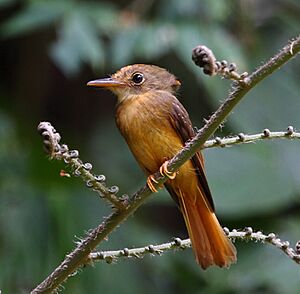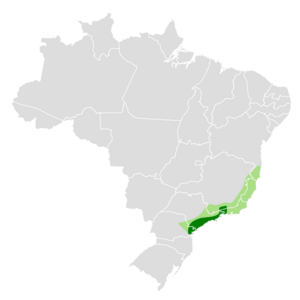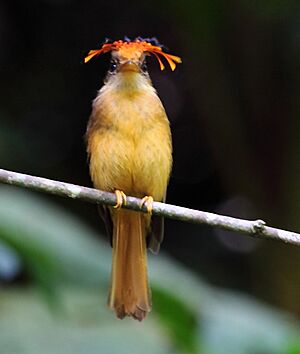Atlantic royal flycatcher facts for kids
Quick facts for kids Atlantic royal flycatcher |
|
|---|---|
 |
|
| At Tapiraí, São Paulo state, Brazil | |
| Conservation status | |
| Scientific classification |
|
| Kingdom: | Animalia |
| Phylum: | Chordata |
| Class: | Aves |
| Order: | Passeriformes |
| Family: | Tityridae |
| Genus: | Onychorhynchus |
| Species: |
O. swainsoni
|
| Binomial name | |
| Onychorhynchus swainsoni (Pelzeln, 1858)
|
|
 |
|
| Script error: The function "autoWithCaption" does not exist. | |
Script error: No such module "Check for conflicting parameters".
The Atlantic royal flycatcher (Onychorhynchus swainsoni) is a beautiful bird found only in Brazil. It's a type of passerine bird, which means it's a perching bird, like many songbirds you might see. This special bird is part of the Tityridae family.
Contents
About the Atlantic Royal Flycatcher
How Scientists Classify Birds
Scientists who study birds sometimes have different ideas about how to group them. For example, some experts consider the Atlantic royal flycatcher a unique species. Others think it's a subspecies of a more common royal flycatcher found across the Americas. These different ways of grouping help us understand how birds are related. But everyone agrees this bird is special!
What Does It Look Like?
The Atlantic royal flycatcher is about 16 to 16.5 cm (6.3 to 6.5 in) long. That's about the size of a small robin. It has a fairly large beak. Its body is mostly dull brown on top. Its rump and tail are a bright cinnamon color. The throat is whitish, and its belly is a yellowish-brown.
The most amazing part of this bird is its crest! It's a fan-shaped group of feathers on its head. When the bird raises it, it looks like a spectacular fan. In males, the crest is scarlet, black, and blue. Females have a yellow, black, and blue crest. This amazing crest is rarely seen, though. The bird usually keeps it flat.
Where Does It Live?
This flycatcher lives only in the Atlantic forest of southeastern Brazil. You can find it from the state of Bahia south to northern Santa Catarina. It prefers humid lowland areas. This includes both old, untouched forests and forests that are growing back. It usually stays in the middle parts of the trees.
Bird Behavior
What Do They Eat?
Like all royal flycatchers, this bird loves to eat insects. They are insect-eaters.
How Do They Raise Their Young?
The Atlantic royal flycatcher builds a very interesting nest. It's long and narrow. The nest hangs down from a branch or vine. Often, it's built right over water. The mother bird usually lays two eggs. Only the female sits on the eggs to keep them warm. She also feeds and cares for the baby birds. They seem to breed in the spring in the Southern Hemisphere. Nest building has been seen in October, and eggs in November. Young birds have been spotted in January.
What Sounds Do They Make?
This bird is usually quiet and hard to spot. Its song is a sad, slow series of whistles [1]. Its call sounds like a repeated "keeeyup or keee-yew" [2].
Protecting the Atlantic Royal Flycatcher
The IUCN (International Union for Conservation of Nature) has listed the Atlantic royal flycatcher as "Vulnerable." This means it's at risk of becoming endangered. Even though new places where they live have been found, there aren't many of them. Scientists estimate there are only about 600 to 1,700 adult birds left. Their numbers are quickly going down. Protecting their forest home is very important to help these special birds survive.
 | Sharif Bey |
 | Hale Woodruff |
 | Richmond Barthé |
 | Purvis Young |



